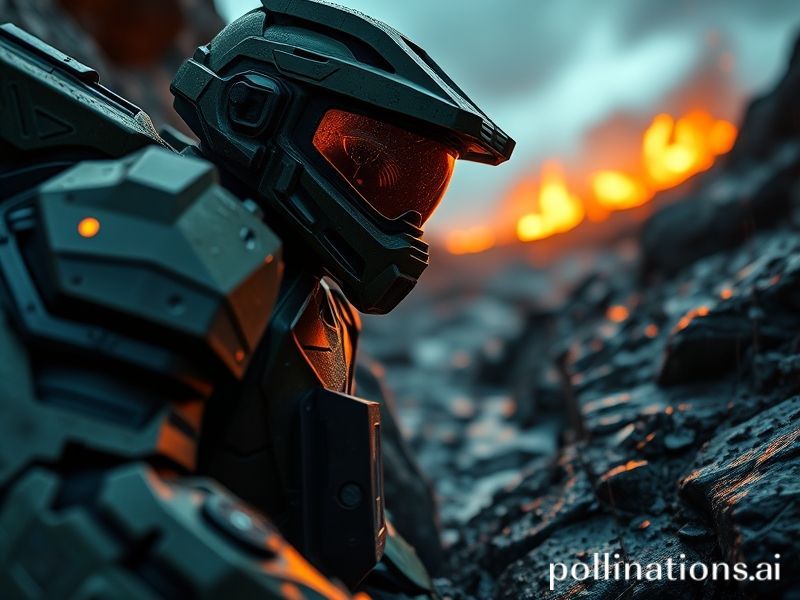Master Chief Goes Global: How the Halo Series Became a $90 Million Mirror to Earth’s Dysfunction
PARIS—In a world still reeling from supply-chain collapses, crypto bankruptcies, and the curious resurgence of fascism as retro chic, Paramount+ has decided what the planet really needs is a nine-episode, $90-million argument about space helmets. The second season of “Halo,” streaming everywhere except the parts of Earth where broadband is still a rumor, arrives like a diplomatic summit where every delegate secretly hopes the others will self-destruct first.
For the uninitiated, “Halo” began as a Microsoft shooter game so addictive that entire UN missions were once delayed because peacekeepers refused to surrender their controllers. Two decades later, the franchise has mutated into a trans-Pacific soft-power warhead: produced by Spielberg’s Amblin, filmed in Budapest with Icelandic tax breaks, post-produced in Toronto, and marketed hardest in Jakarta and São Paulo—cities whose teenagers can recite Master Chief’s kill count faster than their own national constitutions. In other words, the show is less entertainment than a case study in late-capitalist kintsugi: cracks papered over with CGI and union-scale paycheques.
Season One was roasted from Reykjavík to Manila for giving the iconic Spartan helmet more screen time than the face inside it, a creative choice that felt like casting Cary Grant and then locking him in a sarcophagus. Critics called it “a $200-million cosplay tutorial.” Fans called it sacrilege. Everyone else simply wondered why the future still runs on Windows Vista. Season Two, perhaps sensing the approaching asteroid of indifference, has responded with… slightly better lighting and the same existential dread. Progress, 2024-style.
Internationally, the series serves as a Rorschach test for geopolitical anxiety. In Seoul subway ads, Master Chief looms like a cybernetic K-pop idol promising to defend the peninsula from whatever Kim Jong-un is cooking up this week. In Berlin, he looks like an EU immigration officer whose visor doubles as a lie detector. Meanwhile, in Washington, the Pentagon’s official Twitter account applauds the show’s “tactical realism,” which is Pentagon-speak for “please forget our last twenty years of drone footage.” It’s the rare piece of pop culture that can be simultaneously hawkish, escapist, and deeply embarrassed about both.
The plot—something about alien artifacts, rogue AIs, and the ethics of child soldiers—works best as allegory for anyone who’s ever tried cancelling a gym membership. Corporate overlords speak in motivational jargon that sounds eerily like LinkedIn posts; rebels quote Sun Tzu between energy-drink product placements. Watching it, one senses the writers’ room kept a whiteboard labelled “global themes,” then cross-pollinated it with whatever survived Twitter’s latest algorithmic purge. The result is a narrative smoothie that tastes faintly of everything and decisively of nothing, the perfect export commodity for our age of content fatigue.
Financially, the gamble is planetary. Paramount needs new subscribers in 180 countries to offset the crater left by linear TV. If Master Chief’s visor doesn’t move merch in Lagos malls, the entire Viacom balance sheet could wobble. Yet the show’s real legacy may be subtler: proof that even a beloved, bulletproof brand can be strip-mined into just another streaming thumbnail between “The Real Housewives of Kyiv” and a Korean zombie rom-com. Somewhere in Redmond, a Microsoft exec is Googling “how to un-reboot nostalgia,” which is the sort of query that will eventually be answered by the same AI now writing half the scripts.
At the UN cafeteria, where diplomats still argue over who forgot to refill the espresso machine, “Halo” plays on mute above the sushi bar. No one watches; everyone recognizes the armor. That, perhaps, is the series’ most honest achievement: reducing humanity’s interstellar hero to background furniture, a silent reminder that even in the 26th century, the galaxy’s greatest threat remains our own short attention span. The credits roll, the helmets stay on, and Earth spins obstinately toward the next reboot.







